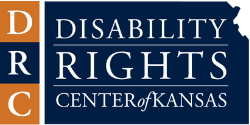Guardianship, Conservatorship & Other Legal Decision Makers
DRC Helps Client Prevent Guardianship

Cullie Orr’s journey to independence was not easy. However, Cullie knew exactly what he wanted. He wanted to choose where he lived. He wanted a job. He did not want or need a guardian. The Disability Rights Center of Kansas (DRC) worked with Cullie to enforce his rights so that he could obtain those things for himself.
What happened to Cullie is an example of how without the right legal representation and advocacy in guardianship cases, the system will continue to ignore the wishes of individuals with disabilities.
Cullie is a person with Down Syndrome and was living with his mom, sister and two nephews in Osawatomie, Kansas. Tragically, Cullie’s mother passed away. Cullie was of course upset because of his loss. So, Cullie visited his Uncle Bill and Aunt Charlotte in Missouri. After being in Missouri for two weeks, Cullie’s sister told him she was now his guardian. His sister essentially told Cullie he must do what she said and that he had to return to Osawatomie. His sister was also his social security representative payee and controlled Cullie’s money.
Cullie did not want to go back to Osawatomie. Cullie had decided that he wanted to live in Missouri. He called the DRC for help. One of DRC’s attorneys, Kip Elliot, investigated the matter. DRC found that Cullie’s sister, in fact, was not his guardian. Cullie had no guardianship placed over him. DRC attorney Kip Elliot advised Cullie that he did not have to return to Osawatomie. DRC also advised Cullie that he could ask Social Security to allow him to be his own payee or to have someone of his choosing become his payee.
When Cullie’s sister was told that Cullie did not have to come back to Osawatomie, she filed a petition in the district court in Osawatomie asking to become Cullie’s guardian. The court appointed an attorney for Cullie in the guardianship case. However, Cullie wanted DRC to represent him. The court appointed attorney would not step aside and would not follow Cullie’s requests, even though Cullie was the client. DRC attorney Kip Elliot filed pleadings in the court to allow him to represent Cullie. A hearing was set to determine who would represent Cullie. DRC also paid to have an evaluation on Cullie performed. The evaluation confirmed that Cullie did not need a guardian.
The night before the court hearing to decide who was going to represent Cullie, DRC attorney Kip Elliot received a call that Cullie’s sister was going to drop her pursuit of the guardianship. However, Cullie’s court appointed attorney wanted Cullie to pay nearly $1,000 for attorney fees! DRC attorney Kip Elliot objected, filed a motion and appeared for the hearing. A few minutes before the hearing started, Cullie’s sister paid the court appointed attorney’s fees with cash and the case was dismissed.
Cullie is now living where he wants to live in Missouri, is receiving community-based services and has a job working in the community Cullie has changed his Social Security representative payee to his Uncle Bill.
This case is important not only for Cullie but for the rights of individuals who are appointed attorneys in guardianship cases. Too often court appointed attorneys do not fight for the rights of their clients in guardianship proceedings. Unfortunately, people still have misperceptions about disability. People don’t focus enough on the person’s abilities and how with the right services and supports guardianship can be avoided. If DRC had not gotten involved and fought for Cullie’s rights, Cullie would be burdened with an unnecessary guardian and he would not be living and doing what he wants.
Exploitive Guardianship Terminated, Restitution Obtained
A guardian/conservator must be held accountable for the decisions that they make on behalf of the person with a disability. There is a crucial bond and trust granted to a guardian/conservator. When they violate that trust, DRC can provide advocacy and support to help ensure accountability. Mary’s case is an example of DRC’s advocacy services in the priority area of guardianship.
Mary contacted DRC when she suspected that her guardian was misusing her funds and unreasonably restricting her life. Mary wanted the opportunity to live in the least restrictive environment and requested that DRC investigate her case and help her terminate the current guardianship.
DRC attorneys investigated Mary’s concerns and determined that she had a legitimate complaint about her guardian. Mary was being financially exploited and the guardian was unnecessarily restricting her life. An attorney for DRC met with the guardian and determined that the guardian was not providing appropriate services as a guardian or conservator. The DRC attorney filed a Petition to Terminate the Guardianship and Conservatorship with the district court. Ultimately, through much litigation and support by DRC attorneys, Mary was restored to capacity and the guardianship/conservatorship was terminated. Mary is now allowed to take care of her own affairs.
DRC then helped Mary recover thousands of dollars that were stolen from her by her guardian/conservator. DRC attorneys began collecting and analyzing numerous accounting records, other documents, and interviewing witnesses. After a complex hearing lasting several days, the district court ruled that the guardian had misused Mary’s funds, and ordered the guardian to repay Mary, including paying a penalty. The guardian filed a motion to reverse the judgment. However, the original ruling was upheld.
Mary was reimbursed for the monies she had lost. She has gained her independence. Instead of others making all her decisions, Mary is now a voice for herself.
DRC Helps Client with Representative Payee Issue
A representative payee is someone who is supposed to help a person manage their benefits. Representative Payees are very important to some people with disabilities. They are there to assist with disbursement of a person’s funds (such as Social Security benefits).
Bill Kester contacted the Disability Rights Center of Kansas with concerns about how his former representative payee for his Social Security benefits had handled his money. Bill was concerned that his payee had mismanaged his Social Security benefits. DRC attorney James Jordan contacted the former payee regarding these concerns. Bill, James and the former representative payee all met to try to settle the issue. With James’s help, Bill and the payee found a compromise that worked for them both.

The former payee agreed to pay Bill $1400 and give him an airless paint sprayer to help settle the matter. A contract was drafted by James and was agreed to and signed by Bill and the former representative payee. In addition to the funds returned to Bill, he was also given the means to supplement his income using the airless sprayer.
.png)





